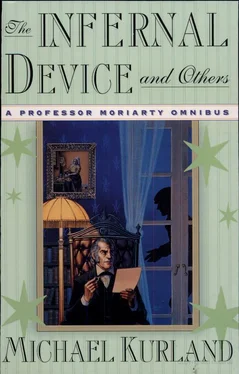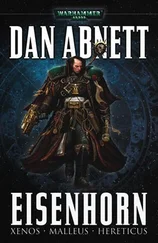Barnett's journalist's ear perked up. "Exile?" he repeated.
Prince Tseng nodded sadly. "My step-cousin-in-law, the Empress Dowager Tz'u-hsi, who rules China through her adopted son, the Emperor Kuang-hsü, has no use for Western ways. She chooses to believe that if you ignore the barbarians at the gates and insult their envoys, they will go quietly away. I advised her otherwise and she did not wish to listen. Soon she no longer wanted to see me or tolerate my presence. I was allowed to request the privilege of residing elsewhere."
"And so the Empress Dowager has lost a valuable advisor," Moriarty said. "And I have gained a trusted friend."
"Say," Barnett said, "if you don't mind my asking, what is all this?" He swept his hand around to indicate all the diverse activities that filled the room.
"This is my factory," Professor Moriarty said. "On the floor below, Prince Tseng manufactures antiques, while up here I create dreams."
"Two conundrums," Barnett said.
"Not at all, not at all," Prince Tseng said. "Here, look!" He went to a ring set into the floor and pulled it up, opening a three-foot-square trapdoor which led down to the floor below. Squatting by the opening, he gestured down. "There you see my workshop. There are my skilled artisans engaged in re-creating the T'ang, the Sung, the Yuan, and the Ming dynasties through representations of their art. Very precise representations."
Barnett gingerly approached the square hole in the floor. Directly below, a row of young women with kerchiefs tied around their heads sat before a long table. Each of them was painting patterns on a piece of unfired pottery with a fine Chinese brush.
"There is a great demand for the antiquities of my country, Mr. Barnett," Prince Tseng said. "It is a vogue — a fad. Unfortunately, very few of these objects have left my country. But the demand must be filled, must it not?" He dropped the trapdoor back into place and stood up.
"That's very interesting," Barnett said, for want of anything better to say. He was in the curious position of not knowing what reaction to have. Here was a prince of the royal family of China — if he was to be believed — presently in exile for unpopular political opinions, who supported himself by manufacturing fake Chinese antiques.
"Not all that interesting, Mr. Barnett," Prince Tseng said. "It's very mundane, really. It's what I must do to finance my work."
"You mean all this?" Barnett asked, gesturing around the room.
"No, sir. My work takes place in my homeland."
"All this," Professor Moriarty interrupted, "is mine. My responsibility entirely. Prince Tseng is good enough to aid me with the calculations and with his scientific insight, but the project is mine."
Barnett looked around the room again. The workers seemed to have tacitly agreed that it was time to quit for the day; they had gathered at a row of wooden lockers and were exchanging their smocks and slippers for street clothes. "I hope this doesn't appear a naive question," Barnett said, "but just what is going on in here?"
"You see before you," Moriarty said, indicating the neat mounds of white silk with a wave of his hand, "the beginnings of what is to become the world's first aerostat observatory."
"Aerostat—"
"An aerostat is a balloon that is filled with some gaseous substance which makes it lighter than air," Prince Tseng said.
"Yes," Barnett said. "Of course. My Uncle Ben was a balloonist in McClellan's army during the Rebellion. After the war he used to give exhibition balloon rides at county fairs. I helped him for a summer, and he taught me a bit about ballooning. It's the juxtaposition of the two words that puzzled me. Does an aerostat observatory observe aerostats or observe from an aerostat?"
"Ah!" Moriarty said. "Our journalistic friend possesses both a practical knowledge of ballooning and a rudimentary sense of humor. A valuable assistant, indeed. I don't trust a man without a sense of humor. For your enlightenment, Barnett" — Moriarty swiveled one of the large, wheeled chalkboards around, revealing a drawing pinned to the reverse side—"this is what the apparatus will look like. It is designed to rise up into the comparatively tranquil air that prevails four or five miles above the earth. It will carry an astronomical telescope of special design and a crew of five: two to work the aerostat and three to perform the experiments and observations."
The drawing, a carefully lined rendering, showed a cluster of balloon gasbags surrounding a central core that must have been the telescope. An elongated, closed gondola was suspended below, and various pieces of equipment, the purpose of which Barnett could not even guess at, were shown affixed to the sides of the gondola.
"Trapped as we are beneath a vast ocean of air that randomly refracts, reflects, and otherwise distorts the rays of light which pass through it," Moriarty said, "we cannot hope to observe properly, much less understand, the universe which we are immersed in and are a part of. And until we manage to understand properly at least the elemental laws by which the universe is run, we cannot hope to begin to understand ourselves: our design, our function, and our purpose, if any."
"Surely," Barnett said, "you can't hope to loft a telescope of any appreciable size with a bunch of balloons."
"True," Moriarty said, returning the chalk board to its original position, "but my calculations indicate that once above nine-tenths of the Earth's atmosphere, a five-inch refractor should achieve a clarity of vision that not even a twenty-inch one achieves on the ground. The twenty-inch has more gathering power, it is true, but in many cases that merely serves to make the blur brighter. Every astronomer has had the experience of having his field of vision become crystal-clear for just one instant, so the nebulosity he is staring at is as sharp as if etched on glass. But before he can put pencil to paper, the atmosphere has again transformed the image to a wavering, flickering blur too indistinct to understand correctly."
"What do you hope to accomplish with your aerostat telescope?" Barnett asked.
Moriarty shook his head. "I may discover the innermost secrets of the universe," he said. "Or then again, I may discover that through some hidden flaw I failed to anticipate, I get no usable information at all from the apparatus. As a very old friend of mine once told me, 'There is no shame in playing the cards that have been dealt to you as long as you play them to the best of your ability.' It was, of course, in another context." Moriarty looked around him. "Well, we seem to have done everything we can for today, gentlemen," he said. "Let us return to Russell Square and see what Mrs. Randall has prepared for us in the way of a supper. I think I could fancy a bit of mutton tonight, and I seem to remember Mrs. H saying something about mutton before I left the house. May I invite you to dine with us this evening, Prince Tseng?"
Tseng Li-chang bowed. "I think not, Professor," he said. "Many thanks for inviting me, but I think my son and I had best stay in this evening and partake of our own poor repast. He has lessons to do, and I could profitably use the time."
"Just as you say," Moriarty said. "I shall see you, then, within the week. Tolliver — go over to the cabstand on Commercial Road and see if you can pick us up a growler. We'll be downstairs."
"Have it here in half a minute, Professor," the Mummer said, and the little man darted back down the stairs, his jacket flapping.
TEN — THE FOUR-WHEELER
A man must make his opportunity, as oft as find it.
— Francis Bacon
As the four-wheeler headed placidly toward Russell Square, Moriarty crossed his arms, lowered his chin onto his clavicle, and sank into a deep reverie. His eyes were open, but it was clear that his thoughts were elsewhere. Mummer Tolliver settled in one corner of the gently swaying growler and whistled to himself with a peculiar tuneless syncopation while rolling a half-crown back and forth along the backs of his fingers. He obviously was prepared to continue this occupation indefinitely.
Читать дальше












